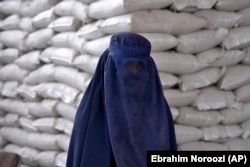A US body set up in 2008 to assess efforts to support Afghanistan has made its 68th and final quarterly report to Congress -- with damning details of waste and "pervasive corruption" over the course of the nearly 20-year Western intervention as well as concerns about Trump administration aid cuts.
The report was issued by the Special Inspector General for Afghanistan Reconstruction (SIGAR), a government agency, on July 30, two weeks before the fourth anniversary of the Taliban retaking power in Afghanistan.
In a section titled "End-Of-Mission Highlights," it says the Western-backed Afghan government sometimes didn't even want projects that the United States proposed.
"For example, SIGAR found that most of the buildings at five Afghan Border Police facilities costing $26 million were either unoccupied or being used for unintended purposes, including one used as a chicken coop," it says.
The 99-page report notes that it is the final installment in a highly detailed series that charted the ups and downs of the US-led mission in Afghanistan, as US aid for the country is being wound up.
"SIGAR's reporting coming to an end is going to be a huge loss," Orzala Nemat, senior associate fellow at the London-based Royal United Services Institute (RUSI) think-tank, told RFE/RL.
"Unfortunately, waste of resources is a fact, not ignorable. And it's good that at least we have one reliable, credible, citable source to make this claim as we move forward."
"If you followed those reports, you were clearly aware where it was going and how it would end," veteran Afghanistan analyst Thomas Ruttig told RFE/RL.
"Politicians chose to ignore this and continue to give us good messages from Afghanistan until the troops had to flee in August 2021. It's a very valuable archive of data on what went wrong in Afghanistan. It would have been much better if donors and particularly the US government would have acted on it," he added.
Elsewhere, the report states that Western countries and global institutions flooded Afghanistan with money that fueled corruption, which US officials overlooked as they "prioritized security and political goals."
Ruttig, who worked in Afghanistan for the United Nations, the European Union, and Germany in a series of stints from 2000 to 2006, agreed with this assessment of Western engagement.
"There was an awareness that [corruption] is a big problem, but it collided with the political strategy and took only second rank," he said. "Security won."
Trump's Afghanistan Policy
But the final SIGAR report is not only a look back at the mission as a whole.
It also underlines the humanitarian impact of the Trump administration's decisions to cut aid to Afghanistan and says the State Department did not explain why specific programs were being terminated.
"State's Bureau of Population, Refugees, and Migration (PRM), told SIGAR they were not informed why individual awards had been canceled, nor were they involved in the decision-making process," the report noted.
The State Department said that in conducting its global foreign assistance review, it learned that over the past approximately four years, foreign assistance intended for the people of Afghanistan was "systematically diverted and expropriated" by the Taliban -- a Specially Designated Global Terrorist group.
"Accordingly, President Trump directed the Department of State to suspend all aid that could reach the hands of the Taliban," it added.
This followed an Executive Order in January that said: "The United States foreign aid industry and bureaucracy are not aligned with American interests and in many cases antithetical to American values."
Within days, the Trump administration began moves to rapidly dismantle USAID, which was the primary US government agency responsible for administering civilian foreign aid and development assistance.
"People are in a despair situation, post-US cuts in Afghanistan," said Nemat, who worked on a USAID project to provide shelters for victims of people trafficking.
"I just don't know what happened to those vulnerable groups that were sheltered thanks to this program, and what happens in future," she added.
The SIGAR report also notes "conflicting reports" of Taliban efforts to seize assets, including military vehicles, from USAID operations being wound down in Afghanistan this year.
"USAID noted that heavily armored units from the Taliban general directorate of intelligence forcibly entered implementing partner compounds on multiple occasions, seizing equipment, cash, and project documentation," it said, adding that staff had been detained and interrogated.
But this contradicted official information from Washington, SIGAR said.
"Both State PRM and PM/WRA (Office of Weapons Removal and Abatement) said their implementing partners have not reported any Taliban demands for assets, data, or staff personal information, and, as previously noted, State F (Office of Foreign Assistance) declined to answer any of SIGAR's questions this quarter," the report stated.
A State Department spokesperson said that pursuant to reporting, including by implementing partners on the ground, the department "has evidence the Taliban diverted aid, expropriated US government property, including armored vehicles, and, through intimidation, exercised control over NGO operations."
The issue is sensitive, with Trump demanding the Taliban hand over military equipment left behind by US forces in 2021.
"Afghanistan is one of the biggest sellers of military equipment in the world, you know why? They're selling the equipment that we left," Trump said in January. "We want our military equipment back."
The State Department added that the United States will not tolerate the Taliban benefiting from assistance intended for the Afghan people.
"Nearly four years since their takeover of Afghanistan, it is due time that the Taliban provide for the welfare of the Afghan people," the State Department spokesperson said.
SIGAR will cease operations in September.
Before then, it will produce two more final reports – one looking at how lessons learned in Afghanistan, Gaza, Syria, and elsewhere can be applied to future situations where aid missions face interference in undemocratic countries, and another that will serve as SIGAR’s final forensic audit of U.S. spending on Afghanistan Reconstruction.
Editor's Note: This story has been updated to include comments by the US State Department.
















